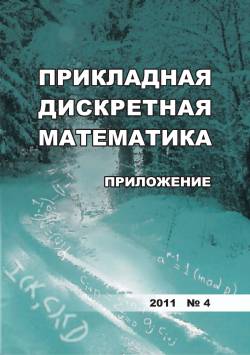On generic complexity of the problem to represent natural numbers by sum of two squares
Generic-case approach to algorithmic problems was suggested by Miasnikov, Kapovich, Schupp and Sh-pilrain in 2003. This approach studies behavior of an algorithm on typical (almost all) inputs and ignores the rest of inputs. In this paper, we study the generic complexity of the problem to represent natural numbers by sum of two squares. This problem, going back to Fermat and Euler, is closely related to the problem of integer factorization and the quadratic residuosity problem modulo composite numbers, for which no efficient algorithms are known. We prove that under the condition of worst-case hardness and P = BPP, for the problem of representation of natural numbers by sum of two squares there is no polynomial strongly generic algorithm. A strongly generic algorithm solves a problem not on the whole set of inputs, but on a subset, the sequence of frequencies which with increasing size converges exponentially fast to 1.
Keywords
генерическая сложность, суммы квадратов, диофантовы уравнения, generic complexity, sums of squares, Diophantine equationsAuthors
| Name | Organization | |
| Rybalov A.N. | S. L. Sobolev Institute of Mathematics SB RAS | alexander.rybalov@gmail.com |
References

On generic complexity of the problem to represent natural numbers by sum of two squares | Applied Discrete Mathematics. Supplement. 2020. № 13. DOI: 10.17223/2226308X/13/33